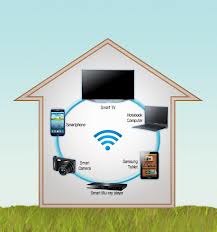I heard an address by a Samsung person at a meeting of the PC User Group on the way of the future - as seen by Samsung. In a word, it's all about having "smart" homes (and offices and in fact lives) as a result of "convergence". By this, Samsung envisages that all our devices - preferably made by Samsung, who seem to be a little more advanced than some of the other manufacturers - will wirelessly communicate with each other with technology that in fact is already available.
One example given was that in the office, powerpoint presentations will be seen by attendees on their tablets, rather than on the screen. In the home, our smart phones/tablets etc will be able to share images with the TV, and the TV will likewise be fitted with a camera so that it can act as a Skype terminal, or even as a monitor of what's going on in the room. Our portable devices will be able to communicate with our heaters, toasters, stoves and other appliances, even the refrigerator. Fear not if your toaster or washing machine isn't geared up to be controlled remotely, you'll be able to instal an adapter on the power supply that will serve the purpose.
The idea seems to be that, if you're travelling home, you'll be able to instruct the heater and kettle to turn on so that all will be in readiness for you when you walk in the door. Likewise you'll be able to monitor your security cameras while you're away, so you can watch the housebreakers at work! And refrigerators of the future will be fitted with bar-code readers to keep a record of what's put in and taken out, with the obvious consequence that you'll be able to ask it via your phone when you're in the supermarket whether you need to buy any more milk. I've taken a couple of liberties with what was said in the presentation, but you get the drift.
One example given was that in the office, powerpoint presentations will be seen by attendees on their tablets, rather than on the screen. In the home, our smart phones/tablets etc will be able to share images with the TV, and the TV will likewise be fitted with a camera so that it can act as a Skype terminal, or even as a monitor of what's going on in the room. Our portable devices will be able to communicate with our heaters, toasters, stoves and other appliances, even the refrigerator. Fear not if your toaster or washing machine isn't geared up to be controlled remotely, you'll be able to instal an adapter on the power supply that will serve the purpose.
The idea seems to be that, if you're travelling home, you'll be able to instruct the heater and kettle to turn on so that all will be in readiness for you when you walk in the door. Likewise you'll be able to monitor your security cameras while you're away, so you can watch the housebreakers at work! And refrigerators of the future will be fitted with bar-code readers to keep a record of what's put in and taken out, with the obvious consequence that you'll be able to ask it via your phone when you're in the supermarket whether you need to buy any more milk. I've taken a couple of liberties with what was said in the presentation, but you get the drift.
To me, an interesting aspect is that none of these concepts involve any really new technology, just a somewhat more sophisticated application of technology that's already with us. What these concepts mainly involve, it seems to me, is a mindset that is accepting of these things, although of course devices that are easier to use will assist. Perhaps my generation struggles with the need for this. We're content to wait until we arrive home to turn the heater on and to look in the refrigerator before we leave for the supermarket to see how much milk is there. But I admit that I may have plateaued. I wonder. I think of our parents, or grandparents, who survived without mobile phones and were content to wait until they arrived home to make a phone call, or to use a public phone by the side of the road for an urgent call. Are we heading for an era when it will be just as natural to check the amount of milk in the refrigerator on your phone as it now is to make a call saying that you're delayed?



You arrive at your smart home but the door does not open as usual(the door is operated by facial recognition technology installed on the CCTV security camera system).
ReplyDeleteLike all technology, it's wonderful so long as it works properly.
Recently we had a power outage in our area for 9 hours. Until this occurs, you don't realise how much of our life depends on electricity.
I think smart homes are further away than Samsung would hope.